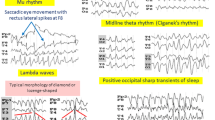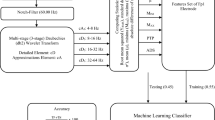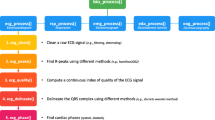Summary
The relation between EEG power density during slow wave sleep (SWS) deprivation and power density during subsequent sleep was investigated. Nine young male adults slept in the laboratory for 3 consecutive nights. Sepctral analysis of the EEG on the 2nd (baseline) night revealed an exponential decline in mean EEG power density (0.25–15.0 Hz) over successive nonrapid eye movement — rapid eye movement sleep cycles. During the first 3 h of the 3rd night the subjects were deprived of SWS by means of acoustic stimuli, which did not induce wakefulness. During SWS deprivation an attenuation of EEG power densities was observed in the delta frequencies, as well as in the theta band. In the hours of sleep following SWS deprivation both the power densities in the frequency range from 1 to 7 Hz and the amount of SWS were enhanced, relative to the same period of the baseline night. Both the amount of EEG energy accumulating subsequent to SWS deprivation and its time course could be predicted accurately from the EEG energy deficit caused by SWS deprivation. The data show that the level of integral EEG power density during a certain period after sleep onset depends on the amount of EEG energy accumulated during the preceding sleep rather than on the time elapsed since sleep onset. In terms of the two-process model of sleep regulation (Borbély 1982; Daan et al. 1984) this finding indicates that EEG power density reflects the rate of decay of the regulating variable, S, rather than S itself, as was originally postulated.
Similar content being viewed by others
References
Agnew HW, Webb WB (1968) The displacement of stages 4 and REM sleep within a full night of sleep. Psychophysiology 5:142–148
Akerstedst T, Gillberg M (1981) The circadian variations of experimentally displaced sleep. Sleep 4:159–169
Beersma DGM, Daan S, Van den Hoofdakker RH (1985) The timing of sleep in depression: theoretical considerations. Psychiatr Res 16:253–262
Beersma DGM, Dijk DJ, Van den Hoofdakker RH, Daan S (1986) Sleep regulation and depression. In: Shagass C, Josiassen RC, Bridger WH, Weiss KJ, Stoff D, Simpson GM (eds) Biological psychiatry, Elsevier, New York, pp 940–942
Benoit O, Foret J, Bouard G (1983) The time course of slow wave sleep and REM sleep in habitual long and short sleepers: effect of prior wakefulness. Hum Neurobiol 2:91–96
Berger RJ, Oswald I (1962) Effects of sleep deprivation on behavior subsequent sleep and dreaming. J Ment Sci 108: 457–465
Berger RJ, Walker JM, Scott TD, Magnusson LJ, Pollack SL (1971) Diurnal and nocturnal sleep stage patterns following sleep deprivation. Psychon Sci 23:273–275
Borbély AA, Baumann F, Brandeis D, Strauch I, Lehmann D (1981) Sleep deprivation: effect on sleep stages and EEG power density in man. Electroencephalogr Clin Neurophysiol 51:483–493
Borbély AA (1982) A two process model of sleep regulation. Hum Neurobiol 1:195–204
Borbély AA, Wirz-Justice A (1982) Sleep, sleep deprivation and depression — A hypothesis derived from a model of sleep regulation. Hum Neurobiol 1:205–210
Bos KHN, Van den Hoofdakker RH, Kappers EJ (1977) An electrode independent function describing the EEG changes during sleep. In: Koella WP, Levin P (eds) Sleep 1976. Karger, Basel, pp 470–473
Bunnell DE, Bevier WC, Horvath SM (1984) Sleep interruption and exercise. Sleep 7:261–271
Czeisler CA, Weitzman ED, Moore-Ede MC, Zimmerman JC, Knauer RS (1980) Human sleep: Its duration and organization depend on its circadian phase. Science 210:1264–1267
Daan S, Beersma DGM (1984) Circadian gating of human sleep and wakefulness. In: Moore-Ede MC, Czeisler CA (eds) Mathematical models of the circadian sleep-wake cycle. Raven Press, New York, pp 129–158
Daan S, Beersma DGM, Borbély AA (1984) Timing of human sleep: recovery process gated by a circadian pacemaker. Am J Physiol 246: R161-R178
Dement W, Kleitman N (1957) Cyclic variations of EEG during sleep and their relation to eye movements, body motility, and dreaming. Electroencephalogr Clin Neurophysiol 9:673–690
Feinberg I (1974) Changes in sleep cycle pattern with age. J Psychiatr Res 10:283–306
Feinberg I, Floyd TC (1979) Systematic trends across the night in human sleep cycles. Psychophysiology 16:283–291
Feinberg I, Fein G, Floyd TC (1980) EEG patterns during and following extended sleep in young adults. Electroencephalogr Clin Neurophysiol 50:467–476
Feinberg I, Fein G, Floyd TC (1982) Computer-detected patterns of electroencephalographic delta activity during and after extended sleep. Science 215:1131–1133
Feinberg I, March JD, Floyd TC, Jimison R, Bossom-Demitrack L, Katz PH (1985) Homeostatic changes during post-nap sleep maintain baseline levels of delta EEG. Electroencephalogr Clin Neurophysiol 61:134–138
Karacan I, Finley WW, Williams RL, Hursch CJ (1970a) Changes in stage 1 REM and stage 4 sleep during naps. Biol Psychiatry 2:261–265
Karacan I, Williams RL, Finley WW, Hursch CJ (1970b) The effects of naps on nocturnal sleep: Influence on the need for stage 1 REM and stage 4 sleep. Biol Psychiatry 2:391–399
Moses JM, Johnson LC, Naitoh P, Lubin A (1975) Sleep stage deprivation and total sleep loss: effects on sleep behavior. Psychophysiology 12:141–146
Nakazawa Y, Kotorii M, Ohishima M, Kotorii T, Hasuzawa H (1978) Changes in sleep pattern after sleep deprivation. Folio Psychiatr Neurol Jpn 32:85–93
Rechtschaffen A, Kales A (eds) (1968) A manual of standardized terminology, techniques and scoring systems for sleep stages of human subjects. US Government Printing Office, Washington, DC
Siegel S (1956) Nonparametric statistics for the behavioral sciences. McGraw-Hill/Kogakusha, Tokyo
Sinha AK, Smythe H, Zarcone VP, Barchas JD, Dement WC (1972) Human sleep-electroencephalogram: a damped oscillatory phenomenon. J Theor Biol 35:387–393
Webb WB, Agnew HW (1971) Stage 4 sleep: influence of time course variables. Science 174:1354–1356
Weitzman FD, Czeisler CA, Zimmerman JC, Ronda JM (1980) Timing of REM and stages 3 + 4 sleep during temporal isolation in man. Sleep 2:391–407
Williams HL, Hammack JT, Daly RL, Dement WC, Lubin A (1964a) Responses to auditory stimulation, sleep loss and the EEG stages of sleep. Electroencephalogr Clin Neurophysiol 16:269–279
Williams RL, Agnew HW, Webb WB (1964b) Sleep patterns in young adults: An EEG study. Electroencephalogr Clin Neurophysiol 17:376–381
Zulley J (1979) Der Einfluss von Zeitgebern auf den Schlaf des Menschen. Rita G Fischer Verlag, Frankfurt
Author information
Authors and Affiliations
Rights and permissions
About this article
Cite this article
Jan Dijk, D., Beersma, D.G.M., Daan, S. et al. Quantitative analysis of the effects of slow wave sleep deprivation during the first 3 h of sleep on subsequent EEG power density. Eur Arch Psychiatr Neurol Sci 236, 323–328 (1987). https://doi.org/10.1007/BF00377420
Received:
Issue Date:
DOI: https://doi.org/10.1007/BF00377420




